When it comes to skincare, we all want to celebrate our skin at every stage of life and today we’re going to focus on mature skin – the Golden Age of skincare!
In the realm of beauty and skincare, ‘mature’ is a term that doesn’t signify ‘old,’ but rather ‘experienced,’ and experience is a beautiful thing. If you’re reading this guide, it’s likely because you’re seeking to navigate the shifts your skin is making as it journeys into its golden era. Well, you’ve come to the right place!
Not sure about your skin type? Try this: How to Find Your Skin Type and Get Glowing, Radiant Skin!
This guide is here to empower you to embrace and care for your skin as it ages, because let’s face it—age is a testament to the glorious journey of life, and your skin should wear it with pride.
Here are the topics we'll be talking about today:
The Nature of Mature Skin
The path to understanding your skin doesn’t stop at a certain age; instead, it continually unfolds like chapters of an intriguing book. As we step into the realm of ‘mature skin,’ we open a new chapter that’s filled with natural transformations and potential shifts in our skincare needs.
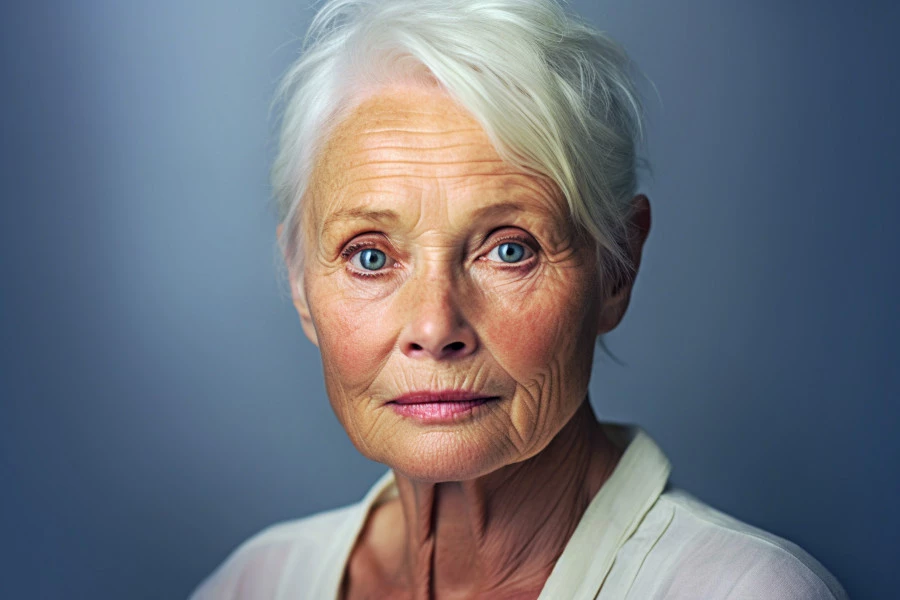
But what does the term ‘mature skin’ mean, and when does our skin start to mature? How can we identify the signs of maturing skin, and most importantly, how can we cater to its evolving needs?
Let’s turn the page and begin this enlightening journey together:
What is Mature Skin?
Mature skin is simply a term used to describe skin that is experiencing the natural aging process. The changes in our skin as we age are the result of both intrinsic factors (our genetics and the passage of time) and extrinsic factors (environmental exposure and lifestyle choices).
So, when we say ‘mature skin’, we’re acknowledging that our skin’s needs are evolving as we navigate through the journey of life.
The Age Factor: When Does Skin Become ‘Mature’?
A common question we hear is, “What age is considered mature for skin?” The answer to this question isn’t straightforward, as skin maturation isn’t dictated by a birthday, but rather by biological and environmental factors.
The skin’s natural rejuvenation processes generally start to slow down around our mid-twenties, and more noticeable changes, like fine lines or dryness, often become more apparent in our thirties and forties.
The key takeaway? Aging is a natural, gradual process, and ‘mature’ is a flexible term that varies for each individual.
Characteristics of Mature Skin
Mature skin often has certain characteristics. These can include fine lines and wrinkles, loss of elasticity and firmness, thinner and more transparent skin, and dryness.
Some people may also experience an increase in pigmentation, like age spots. It’s important to remember that each person ages differently, and these changes occur gradually over time.
In our next sections, we’ll delve into the causes of skin aging, guide you through setting up an effective skincare routine, and offer product recommendations to support your skin as it matures. Let’s embrace the beauty of age together!
Factors That Influence Skin Aging
There’s no fountain of youth (yet!), but understanding the factors that influence the aging process can help us provide our skin with the care it needs to age gracefully.
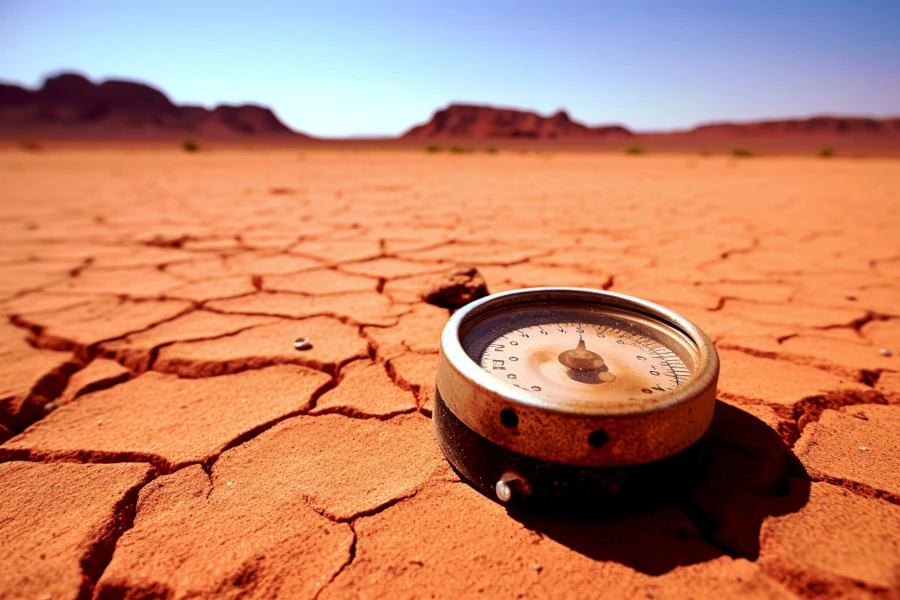
Let’s take a deeper dive:
- Genetic Factors at Play
- The Importance of Diet and Hydration
- Weathering Climate and Environmental Conditions
- The Impact of Sun Exposure and Damage
Genetic Factors at Play
The blueprint of how your skin ages is nestled in your DNA. Some people may notice fine lines in their twenties, while others may not see them until their forties.
Remember, these timelines are not reflective of your skin’s health but are rather part of your unique genetic makeup. It’s like how some people go grey in their twenties—it’s not bad or good, it just is!
The Importance of Diet and Hydration
A well-balanced diet, rich in antioxidants, vitamins, and essential fatty acids, can help support your skin’s health from the inside out.
Proper hydration is also key—after all, our bodies are made up of around 60% water! Drinking enough fluids supports overall health and aids in maintaining the skin’s elasticity and resilience.
Weathering Climate and Environmental Conditions
The environment plays a crucial role in skin health. Cold climates can make skin dry and sensitive, while hot, humid climates can lead to excess oiliness and breakouts.
High altitudes and windy conditions can also affect skin health. It’s essential to adjust your skincare routine according to your environment.
The Impact of Sun Exposure and Damage
UV rays from the sun are one of the main culprits behind premature skin aging. Over time, repeated sun exposure can lead to wrinkles, decreased elasticity, and pigmentation changes. That’s why we’re big proponents of daily sunscreen use—more on this later.
By understanding the factors that affect skin aging, we can adapt our lifestyle and skincare choices to support our skin as it matures.
In the next section, we’ll discuss the skincare routine essentials for mature skin, including cleansing, moisturizing, and sun protection.
Navigating Mature Skin Across Different Skin Types
Aging skin isn’t a homogenous group. Just like in our younger years, mature skin can still fall into various categories, each with unique challenges and needs.

Ready to delve into what it means to have mature skin in combination with the other main skin types, and how to navigate these dual skin type situations?
Mature Normal Skin
Normal skin tends to be well-balanced, neither too dry nor too oily. However, the natural aging process can lead to a reduction in skin elasticity and hydration.
To care for mature, normal skin, focus on moisture retention and elasticity enhancement. Look for products with hyaluronic acid for hydration, and peptides or gentle retinoids like retinyl palmitate to stimulate collagen production, preserving your skin’s natural balance while addressing signs of aging.
Read more: Normal Skin: Radiant Skincare Ultimate Guide
Mature Oily Skin
Mature oily skin can seem paradoxical, but it’s a reality for many. Aging doesn’t automatically rid you of excess sebum (the natural oil your skin produces). The key here is to maintain oil control.
For mature oily skin, look for non-comedogenic products that hydrate without contributing to oiliness. And ingredients like niacinamide can help control oil production and reduce signs of aging, like fine lines and wrinkles.
Read more: Oily Skin: Radiant Skincare Ultimate Guide
Mature Dry Skin
Mature dry skin can feel particularly challenging since both aging and dryness contribute to skin dehydration. Emphasize hydration and nourishment in your skincare routine.
For mature dry skin, look for rich, creamy moisturizers containing hyaluronic acid and ceramides, which help restore and lock in moisture. Be wary of overly aggressive exfoliation, which can further dry out your skin. Gentle chemical exfoliants like lactic acid can be a better choice.
Read more: Dry Skin: Radiant Skincare Ultimate Guide
Mature Combination Skin
Combination skin can be tricky at any age, and aging brings another layer of complexity. The key is balance.
For oilier areas, use products with oil-control properties, such as niacinamide. Dry areas will benefit from hydrating ingredients like hyaluronic acid. And for the whole face, incorporate ingredients that are effective yet gentle, like peptides or bakuchiol.
Read more: Combination Skin: Radiant Skincare Ultimate Guide
Mature Sensitive Skin
Mature sensitive skin requires a delicate approach. Aging and sensitivity both make the skin more susceptible to irritation, inflammation, and damage.
Read more: Harsh Chemicals & Toxic Ingredients to Avoid in Skincare
For mature sensitive skin, consider looking into toxin-free skincare and look out for soothing natural skincare products. Seek out ingredients that are kind to sensitive skin, like argireline (a gentler alternative to retinoids), and always keep hydration in high regard.
Read more: Sensitive Skin: Radiant Skincare Ultimate Guide
Navigating the intersection of mature skin and other skin types can be complex, but it’s entirely possible to manage with a little patience, careful product selection, and a consistent skincare routine.
Daily Skincare Routine for Aging Skin
Aging is a natural process, and our skincare routines should evolve with time to cater to our skin’s changing needs.
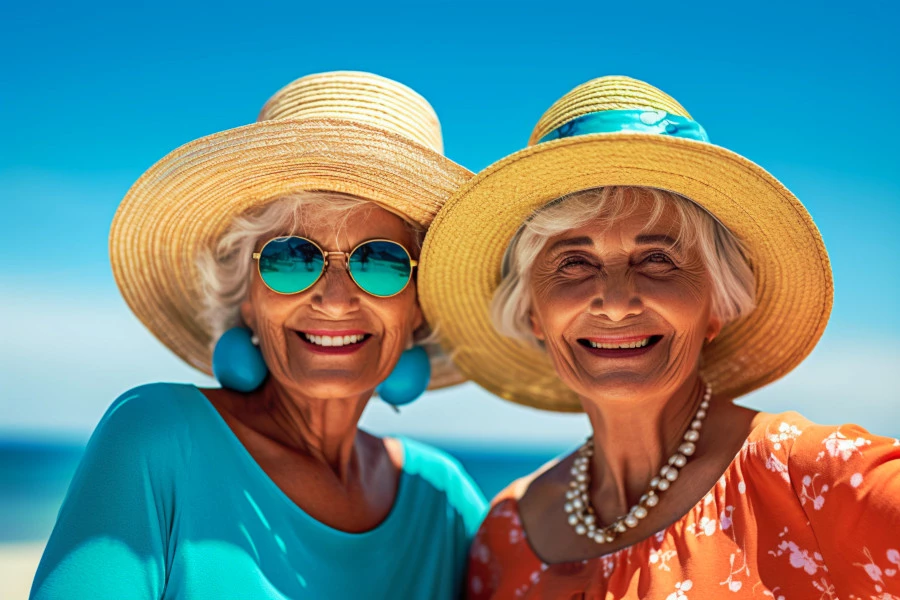
Here’s your blueprint for a daily skincare routine for mature skin:
- Cleansing – The Foundation of Your Routine
- Moisturizing – For Hydration and Nourishment
- Sun Protection – Your Environmental Ally
- Other Tips and Recommendations
Cleansing – The Foundation of Your Routine
Whether you’re 25 or 55, cleansing your face is an essential step in any skincare routine. For mature skin, opt for a gentle, hydrating facial cleanser. It’s important to clean without stripping the skin of its natural oils, which can lead to dryness and irritation.
Read more: Face Washing 101: Cleansing Your Face for Your Skin Type
Moisturizing – For Hydration and Nourishment
As skin ages, it tends to become drier. That’s why moisturizing becomes even more critical. Look for a moisturizer packed with ingredients like hyaluronic acid and ceramides, which can help your skin retain moisture and reinforce its protective barrier.
Sun Protection – Your Environmental Ally
If there’s one skincare step you shouldn’t skip, it’s sun protection. Regular use of a broad-spectrum sunscreen of at least SPF 30 can protect your skin from premature aging caused by UV damage. And remember, it’s not just for sunny days—UV rays can reach your skin even on cloudy or rainy days!
Other Tips and Recommendations
Consider incorporating an exfoliant into your routine once or twice a week. This can help remove dead skin cells and reveal fresher, more radiant skin. You might also find benefit in using targeted treatments for specific concerns, such as a brightening serum for dark spots.
Read more: Building an Effective Personalized Skincare Routine
Up next, we’ll dive into the world of cosmetics and skincare products ideal for mature skin.
Cosmetics and Skincare Products
As mature skin has unique requirements, it’s vital to select products that cater to these needs.
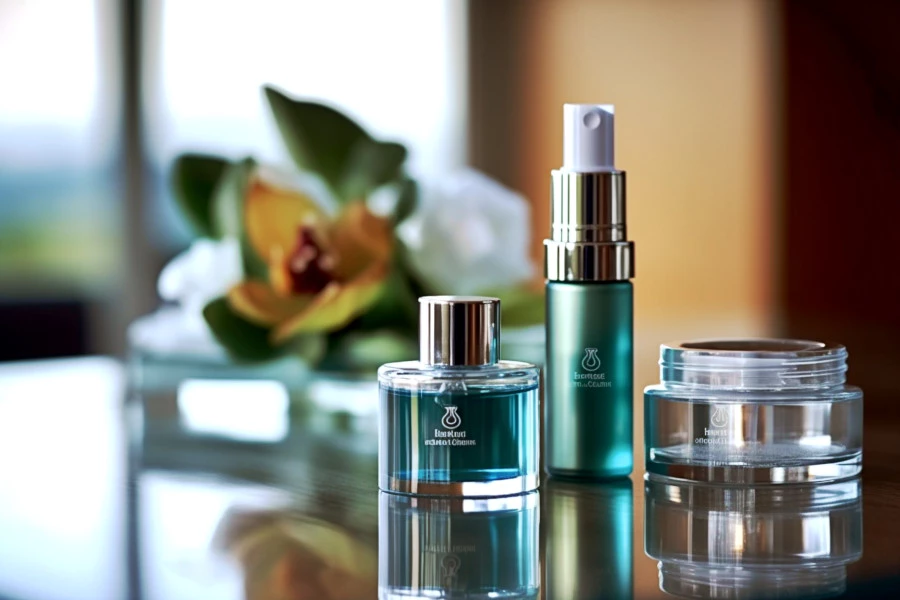
Let’s explore some product recommendations that can help keep your skin looking its best:
- Best Cleansers and Toners for Mature Skin
- Best Moisturizers for Mature Skin
- Best Sunscreens for Mature Skin
- Best Skincare Ingredients for Mature Skin
Best Cleansers and Toners for Mature Skin
When shopping for cleansers and toners, look for products that are gentle and hydrating. Look for cleansers with ingredients like glycerin and ceramides, and toners with soothing components like chamomile or rose water.
Read more: Facial Cleansers: From Basic Suds to Superb Skincare
Read more: Facial Toner Explained: How to Elevate Your Skincare Routine
Best Moisturizers for Mature Skin
For moisturizers, hyaluronic acid is a superstar ingredient. It’s a potent humectant, meaning it helps your skin hold onto water. Other good ingredients to look out for include peptides, which can support collagen production, and ceramides, which help maintain your skin’s barrier function.
Best Sunscreens for Mature Skin
When it comes to sunscreens, broad-spectrum protection and a high SPF are key. However, it’s also important to choose a sunscreen that feels good on your skin, as this increases the likelihood that you’ll wear it every day. Mineral sunscreens with zinc oxide or titanium dioxide are generally well-tolerated, even by sensitive skin.
Best Skincare Ingredients for Mature Skin
In addition to the ingredients mentioned above, there are several other powerful ingredients to look out for.
Retinol, a form of vitamin A, can help reduce the appearance of fine lines and wrinkles. Vitamin C, a potent antioxidant, can help protect your skin from environmental damage and brighten your complexion. Niacinamide, also known as vitamin B3, can help improve skin elasticity and reduce discoloration.
Read more: Skincare Ingredients: Complete A-Z Guide
Now that we’ve got our products sorted, let’s move on to the next section, where we’ll address specific skin concerns that often come with mature skin.
Addressing Specific Skin Concerns
Each person’s skin is unique and may face different challenges as it matures.
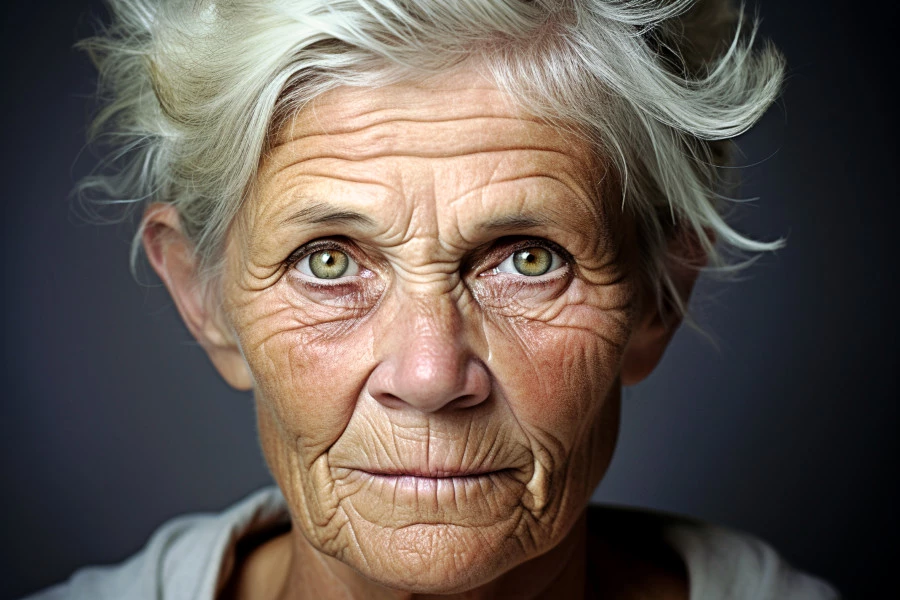
In the next sections, we’ll explore how to tackle some common skin concerns that may arise with age:
- Acne and Enlarged Pores
- Fine Lines and Wrinkles
- Skin Sensitivity and Redness
- Hyperpigmentation and Dark Spots
- Consulting a Dermatologist
Acne and Enlarged Pores
Believe it or not, acne can persist into adulthood and even into our mature years. If you’re dealing with breakouts, consider a product containing salicylic acid, a beta-hydroxy acid that can penetrate the pores and help clear out blockages. For enlarged pores, products with retinol can help by increasing cell turnover.
Fine Lines and Wrinkles
To address fine lines and wrinkles, invest in a good quality retinoid product. Peptides and antioxidants like vitamin C also help in collagen production, reducing the appearance of wrinkles over time.
Skin Sensitivity and Redness
As skin matures, it may become more sensitive and prone to redness. To soothe sensitive skin, opt for fragrance-free, hypoallergenic products. Green tea and aloe vera are two ingredients known for their soothing properties.
Hyperpigmentation and Dark Spots
Sun damage accumulated over the years often leads to hyperpigmentation and dark spots. Look for products containing brightening ingredients like vitamin C, kojic acid, and licorice root extract. And remember, a broad-spectrum sunscreen is your best friend in preventing further sun damage.
Consulting a Dermatologist
If over-the-counter treatments aren’t enough, or if you have concerns about your skin health, don’t hesitate to consult a dermatologist. They can offer advice tailored to your skin’s needs and can provide access to prescription treatments if necessary.
Conclusion: Love Your Skin More Every Day!
Navigating the changes that come with mature skin can be a challenge, but with the right knowledge and skincare routine, it’s a journey that can be rewarding.
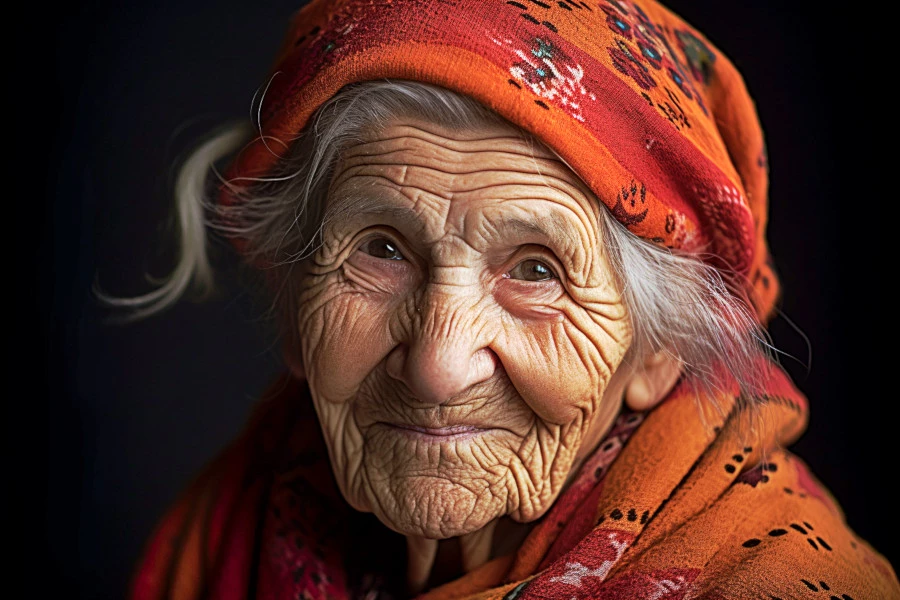
Understanding your skin and giving it the love it deserves can result in a healthy, radiant glow at any age. Celebrate your skin’s maturity, and remember, age is just a number—it’s how you feel inside that truly counts!
This brings us to the end of our comprehensive guide to mature skin. We hope this serves as a valuable resource on your skincare journey, and we encourage you to explore the rest of our website for more skincare advice and insights. Here’s to your skin’s health and radiance, today and always!
Stay fabulous!
Frequently Asked Questions
Here are some of the most common questions (and the answers, of course) relating to mature skin:
- How do I know if I have mature skin?
- At what age does the skin mature?
- What makes you look older than your age?
- At what age do wrinkles start?
- Why do some people not get wrinkles?
- At what age does your face change most?
- How do you fix mature skin?
- What slows down aging?
- How can I look 20 years younger naturally?
- Does stress cause aging?
- How does menopause affect skin?
- What is the best skincare routine for mature skin?
- How often should mature skin be exfoliated?
- Are there any foods that can help with skin aging?
- How does hydration affect mature skin?
- Can lifestyle changes help improve mature skin?
- What’s the difference between wrinkles and fine lines?
Your skin is unique, and what brings radiance to one might not do the same for another. Never hesitate to seek the advice of a dermatologist if you’re unsure about any aspect of your skin health.
How do I know if I have mature skin?
Mature skin often shows signs like fine lines and wrinkles, loss of skin elasticity leading to sagging, dryness, thinning of skin, and uneven skin tone. You may also notice larger pore size and age spots.
At what age does the skin mature?
Skin maturation varies from person to person due to genetics, lifestyle, and environmental factors, but it typically begins in your late 20s or early 30s. This is when collagen production begins to slow down and the first signs of aging, like fine lines, may start to appear.
What makes you look older than your age?
Factors like excessive sun exposure, smoking, poor diet, lack of exercise, and chronic stress can accelerate the aging process, making you look older than your actual age. Also, neglecting a consistent personalized skincare routine can contribute to premature aging.
At what age do wrinkles start?
The onset of wrinkles varies greatly among individuals, but fine lines often start to appear in your late 20s to early 30s. Deeper wrinkles typically become more noticeable in your 40s and 50s.
Why do some people not get wrinkles?
Genetics play a large role in how your skin ages. Some people naturally produce more collagen and have thicker skin, which can delay the appearance of wrinkles.
Lifestyle choices, like avoiding sun exposure, not smoking, maintaining a healthy diet, and consistently following a skincare routine, can also help prevent wrinkles.
At what age does your face change most?
Significant changes to facial structure often happen during our mid to late 20s when our bodies stop producing as much collagen. This can lead to changes in the skin’s elasticity and firmness. Another significant change typically happens in our 40s and 50s due to the loss of facial volume and bone mass.
How do you fix mature skin?
While you can’t reverse aging, you can take steps to improve the appearance of mature skin. Maintaining a skincare routine that includes regular cleansing, exfoliating, and hydrating can help. Look for products containing retinol, peptides, antioxidants, and hyaluronic acid. Don’t forget sunscreen – it’s a must for preventing further sun damage.
What slows down aging?
Healthy lifestyle habits can slow down aging. This includes maintaining a balanced diet rich in antioxidants, regular exercise, adequate sleep, stress management, and of course, a solid skincare routine. Consistently using sunscreen, moisturizers, and ingredients like retinol can make a big difference.
How can I look 20 years younger naturally?
While it’s not realistic to rewind time by 20 years, you can certainly improve your skin’s appearance with a few natural steps. Hydrate well, eat antioxidant-rich foods, exercise regularly, and get enough sleep.
Maintain a consistent skincare routine that includes cleansing, moisturizing, and protecting your skin from the sun is also important. Using skincare products with natural ingredients like green tea, vitamin C, and rosehip oil can also help.
Does stress cause aging?
Yes, chronic stress can accelerate the aging process. Stress leads to inflammation in the body, which can break down collagen and elastin, leading to premature wrinkles, fine lines, and other signs of aging.
How does menopause affect skin?
Menopause leads to a decrease in estrogen levels, which can result in dryness, loss of elasticity, thinning of the skin, and an increase in wrinkles. It’s important during and after menopause to moisturize regularly, and maintain a healthy diet.
What is the best skincare routine for mature skin?
A skincare routine for mature skin should focus on hydration, and nourishment. Cleanse gently but thoroughly, use a rich moisturizer, apply a broad-spectrum sunscreen daily, and incorporate products with ingredients like retinol, peptides, antioxidants, and hyaluronic acid.
How often should mature skin be exfoliated?
As the skin ages, it doesn’t renew itself as quickly, leading to a build-up of dead skin cells that can cause dullness. It’s generally recommended to exfoliate mature skin 1-2 times per week, but this can vary depending on your skin’s sensitivity and the type of exfoliant you’re using.
Are there any foods that can help with skin aging?
Absolutely. A diet rich in antioxidants can help fight skin aging. Eat lots of fruits and vegetables, especially those high in vitamins A, C, and E. Foods rich in omega-3 fatty acids, like fish and walnuts, can also contribute to skin health.
How does hydration affect mature skin?
Hydration is critical for mature skin. As skin ages, it becomes thinner and loses its ability to retain moisture, leading to dryness and the appearance of wrinkles. Drinking plenty of water and using a good moisturizer can help maintain your skin’s hydration levels.
Can lifestyle changes help improve mature skin?
Yes, in addition to a good skincare routine, lifestyle changes can significantly impact the health and appearance of your skin. This includes maintaining a healthy diet, regular exercise, adequate sleep, reducing stress, avoiding sun damage, and not smoking.
What’s the difference between wrinkles and fine lines?
Fine lines are superficial and often the first sign of skin aging. They’re usually caused by facial expressions, sun damage, or other lifestyle factors.
Wrinkles are deeper, more permanent, and typically form in areas where the skin naturally folds during facial expressions.
Both can be minimized with a good skincare routine and lifestyle habits.